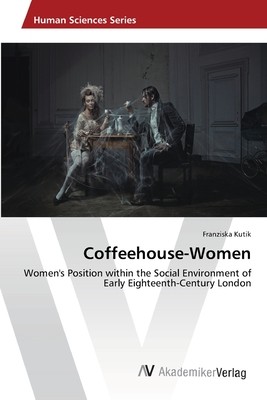
- We will send in 10–14 business days.
- Author: Franziska Kutik
- Publisher: AV Akademikerverlag
- ISBN-10: 3639404114
- ISBN-13: 9783639404111
- Format: 15.2 x 22.9 x 0.4 cm, minkšti viršeliai
- Language: English
- SAVE -10% with code: EXTRA
Reviews
Description
Towards the end of the seventeenth century an institution developed that encouraged the emergence of public life in London and simultaneously illustrated the separation within London's society: the coffeehouse. Affected by various contradictions, the coffeehouse opposes peaceful sociability to boisterous nocturnal activities. With regard to literature, periodicals give a different impression of coffeehouse incidents than other literary works such as biographies or plays. The present paper examines these opposing depictions by focussing on the different perceptions of women and their literary adoption. Primarily, the lives of the so-called "coffee-women", the owners of the often brothellike coffeehouses, are being examined with the help of two biographies. Additionally, an excursus links the importance of the hetaerae for ancient Greek and Roman societies to the coffeehouse-women of eighteenth-century London.
EXTRA 10 % discount with code: EXTRA
The promotion ends in 21d.05:47:57
The discount code is valid when purchasing from 10 €. Discounts do not stack.
- Author: Franziska Kutik
- Publisher: AV Akademikerverlag
- ISBN-10: 3639404114
- ISBN-13: 9783639404111
- Format: 15.2 x 22.9 x 0.4 cm, minkšti viršeliai
- Language: English English
Towards the end of the seventeenth century an institution developed that encouraged the emergence of public life in London and simultaneously illustrated the separation within London's society: the coffeehouse. Affected by various contradictions, the coffeehouse opposes peaceful sociability to boisterous nocturnal activities. With regard to literature, periodicals give a different impression of coffeehouse incidents than other literary works such as biographies or plays. The present paper examines these opposing depictions by focussing on the different perceptions of women and their literary adoption. Primarily, the lives of the so-called "coffee-women", the owners of the often brothellike coffeehouses, are being examined with the help of two biographies. Additionally, an excursus links the importance of the hetaerae for ancient Greek and Roman societies to the coffeehouse-women of eighteenth-century London.


Reviews